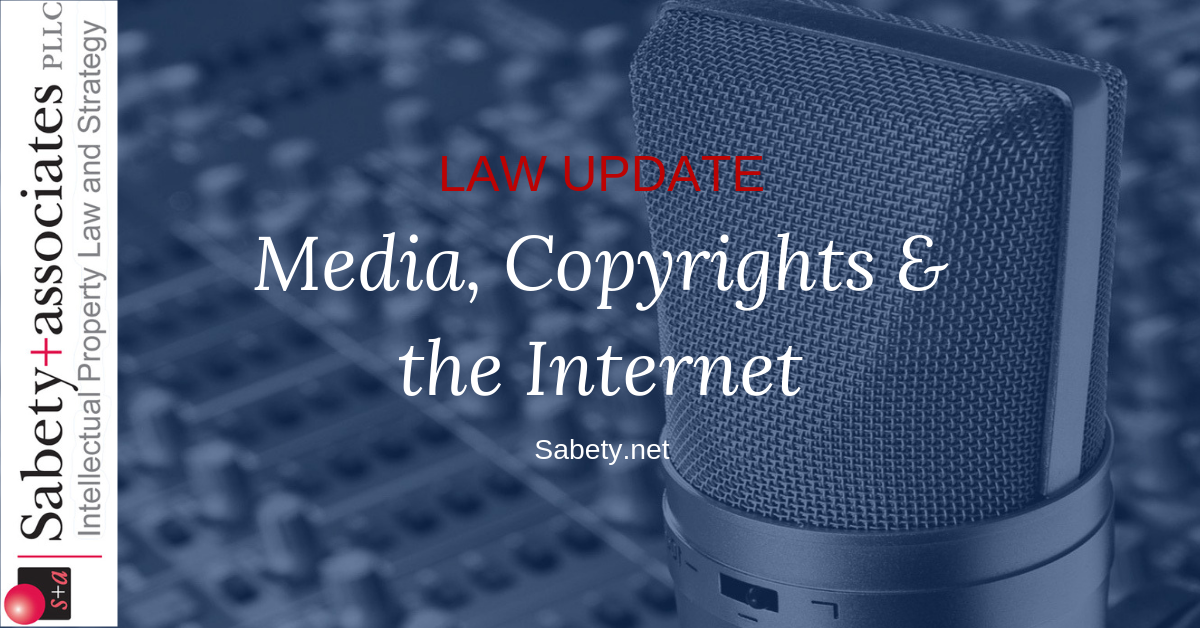2003 Begins with a Flurry of Activity in the Copyright Protection Arena.
Range of Media Industry Players File Comments on Broadcast Digital Television Copy Protection Regulations.
December 6th, 2002
In response to the Federal Communications Commission (FCC) Notice of Proposed Rulemaking regarding copyright protection for broadcast digital television (DTV) based on a “broadcast flag,” several industry groups filed comments, including the National Music Publishers Association (NMPA). The comments generally fell into three categories: (i) the proposed “broadcast flag” regulations that resulted from the Broadcast Protection Discussion Group (BPDG) are fair and appropriate, submitted by the consumer electronics industry (CE) and the Motion Picture Association of America (MPAA); (ii) any regulations mandating copy protection technology are unwelcome, submitted by the Business Software Alliance (BSA), notwithstanding their member’s involvement in the BPDG and (iii) that due consideration of economic effects on copyright holders outside of broadcast television is necessary because the
regulations, especially as proposed, are incomplete and will have a negative impact on these rights holders, thus pointing to Copyright Office participation, submitted by the National Music Publishers Association (NMPA). 1 Phillips Electronics filed comment against mandated copy protection technology, which is understandable in light of its recent joint acquisition of DRM technology provider InterTrust.2
Cable Television Operators and Consumer Electronics Industry Agree to Include Access Control Technology in Digital Television Receivers.
December 19th, 2002
The CE industry and the cable television industry announced a sweeping agreement that permits the CE manufacturers to include within their products access control technology typically provided by the cable operator as a “set-top box.” The proposed scheme interlocks their agreement on a particular access control framework with proposed regulations for the FCC and a patent license to the underlying technology, called “DFAST,” which includes technical requirements as well as providing exemptions that impact the design of the
television device, the activities of the cable operator as well as the economic position of copyright holders. Phillips was a participant. The FCC later announced the beginning of regulatory proceedings for addressing this approach, initial comments are to be filed by March 28th, 2003.
BSA, CSPP and RIAA Announce Agreement on Copy Protection Policy.
January 14th, 2003
The BSA, Computer Systems Policy Project (CSPP)3 and Recording Industry Association of America (RIAA) announced their agreement on principles regarding copyright issues that will “govern [their] activities in the public and policy arenas during the 108th Congress.” The agreement stated that governmental mandated copy protection is “not practical” and “not the best way to serve the long-term interests of record companies, technology companies, and consumers.” The agreement did not provide specifics with regard to the scope of permissible consumer use or further re-distribution by consumers of digital music copies other than providing for a recognition of “consumer expectations.” BSA’s resistance to a mandated copy protection standard is understandable in light of the dominant position of its benefactor, Microsoft, who also supplies DRM technology to PressPlay, the record industry-sponsored on-line music service.
MPEG4 LA Announces License Terms, while Participants Push for Copy Protection Standard.
February 4th, 2003
Following a long period of discussion, a patent pool called the MPEG4 LA4 group released their license agreement for the MPEG4 video compression algorithm. Most notable is that MPEG4 LA dropped its insistence on a “per time” royalty for encoding programming, generally viewed as unworkable and a barrier to adoption to what is hoped to be the successor to MPEG2, the basis of DVD. In the meantime, Apple Computer, among others, is pushing the MPEG4 group to adopt a copyright protection standard as part of MPEG4. This approach is probably necessary to stave off the potential domination of Microsoft, who recently introduced its Windows Media 9 Series copy control technology called the “Windows Media Data Session Toolkit.”
Joint Comment filed by NMPA, ASCAP, BMI and SGA on Proposed Broadcast Digital Television Copy Protection Regulations.
February 18, 2003
The National Music Publishers Association (NMPA) was joined by the American Society of Composers, Authors and Publishers (ASCAP), Broadcast Music Inc (BMI) and Songwriters Guild of America (SGA) in filing additional joint comments to the FCC regarding broadcast DTV copy protection. Among other issues, they pointed out that: (i) specific problems with the proposed regulations that would, for example, expressly exempt unprotected CD-quality digital audio output from a compliant “copy protected” DTV receiver; (ii) the level of robustness of a mandated copy protection technology should be relatively high due to the fact that copyright infringement has become an industry that attracts investment in hacking these systems and (iii) control over “downstream” redistribution must be compliant with current copyright law governing “fair use.” 5
Copyright Office Receives Numerous Proposals for Exemption from AntiCircumvention
Law.
February 2003.
As required by Digital Millennium Copyright Act, the Copyright Office is to periodically consider cases where the prohibitions on circumvention of access control technologies have an “adverse effect” on legitimate use of the works. In this first review, the office received a large number of submissions. The music industry made a submission arguing against proposed exemptions sought by the internet webcasters which were viewed as outside the statutory authority for any exemption from the anti-circumvention law.
Microsoft e-Book DRM Reportedly Hacked.
March 2003.
Reports circulate that a small utility called “Convert Lit” or “Clit.exe” can easily extract clear text from encrypted e-Books protected by Microsoft’s DRM5 security.

